Can we have an honest conversation about community meetups? I’ve been on both sides of this equation—organizing events and watching well-intentioned marketing teams struggle—and I’ve noticed something important: there’s a fundamental disconnect in how many of us approach community gatherings.
If you’ve ever thought of community meetups as primarily promotional opportunities, we need to talk. Not because you’re wrong to want marketing results (that’s literally our job!), but because this approach isn’t just ineffective—it might actually be hurting your brand in ways you don’t realize.
“But We Need to Show Our Product!”—The Meetup Misconception
I get it. I really do. Your team has targets to hit, and your boss is asking about ROI for that meetup sponsorship. So naturally, you approach these events with your marketing playbook in hand:
- Set up that branded backdrop for maximum logo visibility
- Print stacks of glossy one-pagers to distribute
- Prepare the product demo to run during your speaking slot
- Bring plenty of lead capture forms
- Train your team on conversion talking points
I’ve been there! But here’s the thing I’ve learned the hard way: community meetups operate by completely different rules than marketing events. When we treat them the same way, it’s like showing up to a book club with a PowerPoint presentation—awkward for everyone involved.
Understanding the True Nature of Community
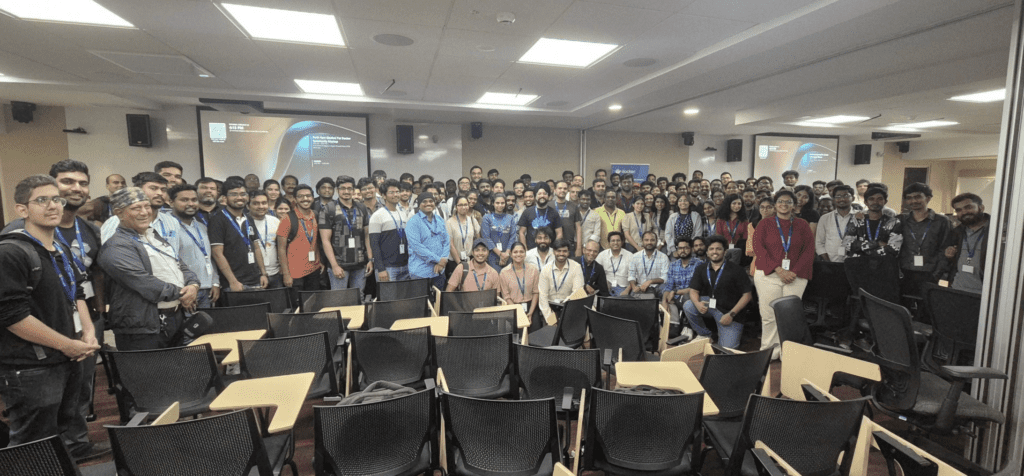
Communities form around shared interests, challenges, and passions—not products. Whether it’s developers gathering to discuss the latest in cloud architecture, data scientists exploring new machine learning techniques, or designers sharing UX insights, these communities exist to help their members grow, learn, and connect.
The most valuable aspects of community meetups for attendees are:
- Knowledge exchange – Learning from peers facing similar challenges
- Relationship building – Forming connections with like-minded professionals
- Skill development – Gaining practical insights they can apply in their work
- Belonging – Finding their “tribe” of people who share their interests and challenges
None of these motivations involves being sold to.
When Good Intentions Go Wrong (A True Story)
Let me share something that happened a few months back. A brilliant developer was excited about a local container orchestration meetup. She’d been struggling with some Kubernetes challenges and was hoping to connect with others facing similar issues.
The meetup description promised discussion and knowledge-sharing. But what did she get instead? A 90-minute sales presentation thinly disguised as a “technical talk,” where the speaker’s answer to every question somehow circled back to their product features.
“I felt ambushed,” she told me afterward. “I took time away from my family for what turned out to be just a sales pitch. I won’t make that mistake again.”
Here’s the kicker: the company that gave the presentation likely marked it as a success in their marketing dashboard. But they didn’t see what I saw—a room full of developers exchanging knowing glances, quietly disconnecting from the company’s Slack community the next day, and sharing their disappointing experience with colleagues.
That’s the hidden cost of promotional meetups: not just the absence of positive results, but the creation of active brand detractors.
The Right Approach: Building Value and Awareness
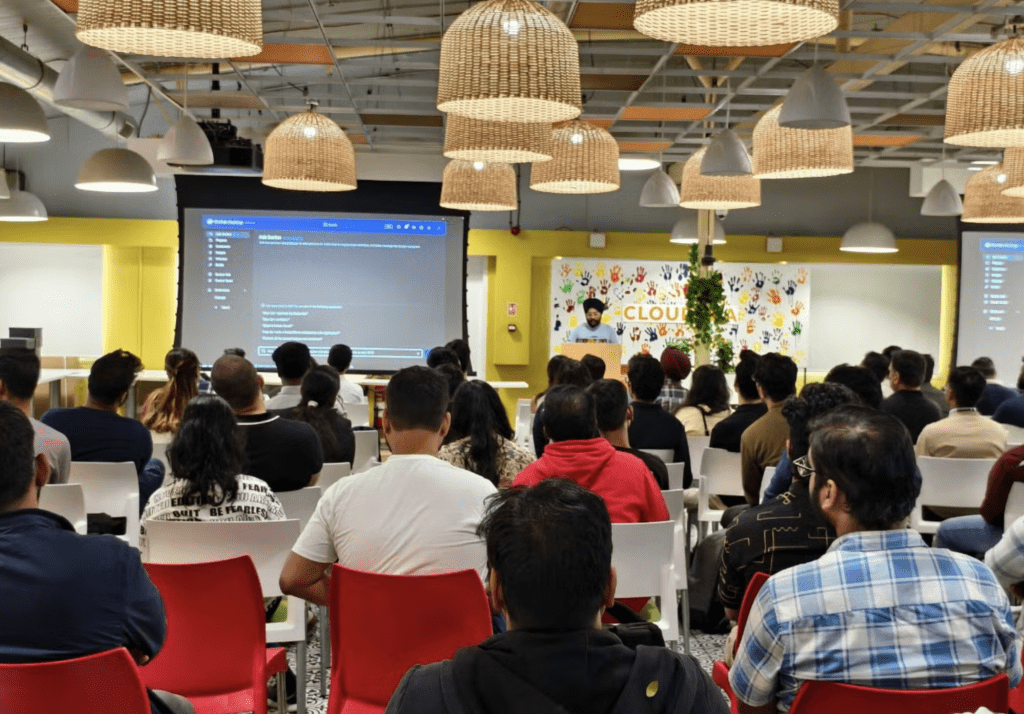
So if meetups aren’t for promotion, should marketers abandon them? Absolutely not! Properly executed, community meetups can be among your most powerful marketing tools—just not in the direct, transactional way many expect.
Here’s how to approach community meetups effectively:
1. Lead with Education, Not Promotion
I’ve found that the most successful community events prioritize sharing genuinely helpful knowledge that attendees can immediately apply—regardless of whether they use your product. This approach demonstrates real expertise and builds authentic trust in ways that promotional content simply can’t match.
Example: Instead of presenting “How Our Product Solves Your Problems,” share “Industry Best Practices for Solving Common Challenges” with occasional, natural references to how your approach aligns with these practices.
Let me share a recent real-world success story that perfectly illustrates this principle: the “Cloud-Native LLMOps Day Bengaluru!” event organized in collaboration with Snowflake, LocalStack, Docker, and the Collabnix community.
Despite being sponsored by major tech companies like Snowflake and Microsoft, this event wasn’t perceived as promotional by attendees. Why? Because the organizers thoughtfully structured it as a mix of hands-on workshops and educational talks focused on solving real challenges in the LLMOps space.
The feedback from community members was overwhelmingly positive. Attendees specifically mentioned how refreshing it was to participate in sponsored sessions that delivered genuine value rather than thinly-veiled sales pitches. The hands-on component was particularly effective—participants learned practical skills they could immediately apply in their work.
What made this approach so successful?
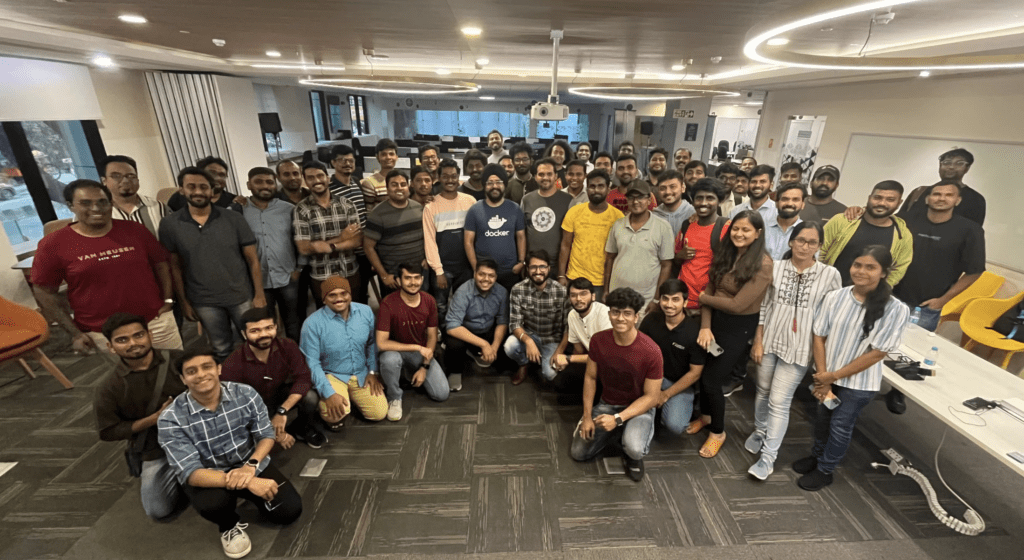
- Practical skill-building: The workshops focused on techniques and approaches that worked across different technology stacks, not just with the sponsors’ products.
- Problem-centric content: Sessions addressed common challenges faced by practitioners in the field rather than product-specific features.
- Authentic expertise: Presenters established credibility by demonstrating deep understanding of the problem space before naturally explaining how their solutions approached these challenges.
- Balance of theory and practice: The combination of conceptual talks and hands-on sessions catered to different learning styles and needs.
In the weeks following the event, sponsors reported increased interest and organic inquiries about their products—not because they pushed for it during the event, but because attendees naturally became curious about the tools used by the experts who had just helped them solve their problems.
That’s the power of leading with education instead of promotion: you don’t just create a positive impression; you build credibility that leads to organic interest.
2. Prioritize Community Needs Over Business Objectives
When planning content or activities, ask first “What would be most valuable to attendees?” rather than “How can we showcase our product?”
Example: If community members are struggling with security compliance, offer a workshop on this topic even if it’s not directly tied to your primary product features.
3. Be Transparent About Company Affiliation
Don’t try to disguise promotional content as community content. Be upfront about who you are and your connection to the sponsoring company.
Example: “Hi, I’m XYZ. While I’d be happy to chat about our solutions during breaks, today I’m here to share some insights on industry challenges we’ve observed across many organizations.”
4. Create Space for Genuine Connection
Facilitate meaningful interactions between attendees rather than controlling the conversation.
Example: Include workshop components, breakout discussions, or structured networking where attendees can share their own experiences and learn from each other.
5. Measure Success Differently
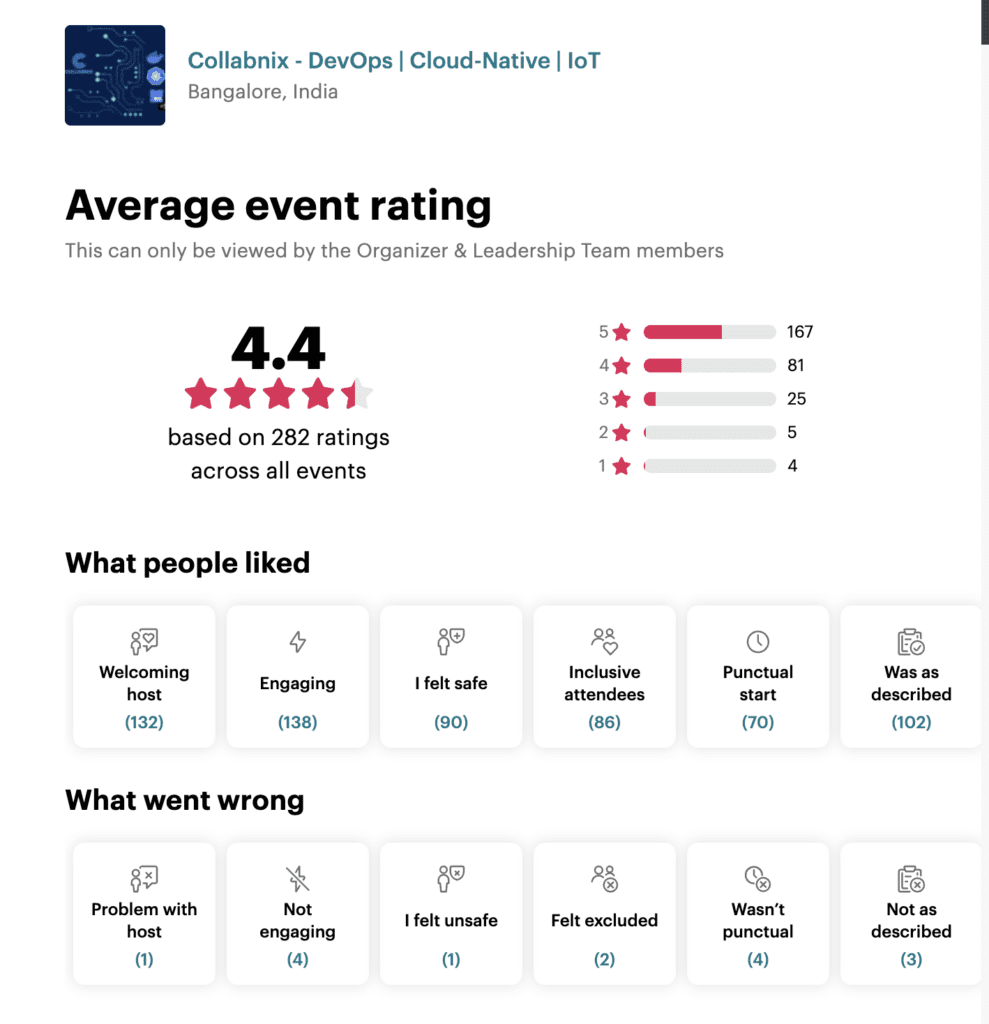
Instead of counting leads or attributing sales, measure:
- Engagement quality (questions, discussions)
- Content usefulness (attendee feedback)
- Relationship development (ongoing community participation)
- Brand sentiment (how attendees talk about your company afterward)
The Long Game: From Awareness to Advocacy
The real marketing value of community meetups isn’t measured in immediate conversions but in the journey from awareness to advocacy:
- Awareness: Attendees become familiar with your company as a knowledge source
- Association: Your brand becomes associated with expertise and value
- Trust: Through repeated value delivery, you build credibility and trust
- Consideration: When needs arise, your solution enters the consideration set
- Advocacy: Satisfied customers become community advocates, creating a virtuous cycle
This journey can’t be rushed. It requires patience and consistent value delivery over time.
Real-World Success Stories
Collabnix Community Approach
The Collabnix community, focused on container technologies like Docker and Kubernetes, has grown into one of the most respected open-source communities through their education-first approach. Their meetups and virtual events focus almost exclusively on hands-on labs, practical problem-solving, and knowledge sharing—not on product pitches or sponsorship promotions. Community members collaborate on documentation, tutorials, and real-world solutions that benefit everyone. The result? A thriving global community of over 11,000 DevOps enthusiasts and cloud professionals who actively participate, contribute, and advocate for the community’s resources.
Practical Steps for Your Next Community Meetup
- Audit your planned content – Remove explicit promotional messaging and replace with educational content
- Train your speakers – Help them understand the difference between a meetup talk and a sales presentation
- Set appropriate expectations internally – Educate stakeholders about the long-term value of community investment
- Listen actively – Use meetups to gather insights about community challenges rather than just to broadcast messages
- Follow up appropriately – Send valuable resources rather than sales follow-ups after the event
Let Me Tell You a Secret About Community Marketing
Here’s the counterintuitive truth I wish someone had told me years ago: The less directly you try to sell at community events, the more effective they become as marketing tools.
I remember the first time I truly understood this. We’d sponsored a developer meetup, and instead of our usual product-focused approach, we sent our senior engineer with a presentation that was 100% educational—no product mentions at all. Just valuable insights about a common industry challenge.
I was nervous. How would we justify the expense without direct promotion?
But something magical happened. After the talk, developers swarmed our engineer with questions. Several specifically asked about our company, having noticed our understated logo on the slides. Three even reached out the following week asking for demos.
Nobody had to be “sold”—they came to us, curious and already half-convinced because we’d demonstrated expertise without pushing it on them.
That’s the beautiful paradox of community marketing: generosity and patience create better business outcomes than immediate promotional tactics ever could.
So next time you’re planning a community meetup, ask yourself: “Am I here to give or to take?” When you genuinely focus on giving, you’ll be amazed at what comes back to you.
After all, you’re not just marketing to a community; you’re becoming part of it. And that makes all the difference.

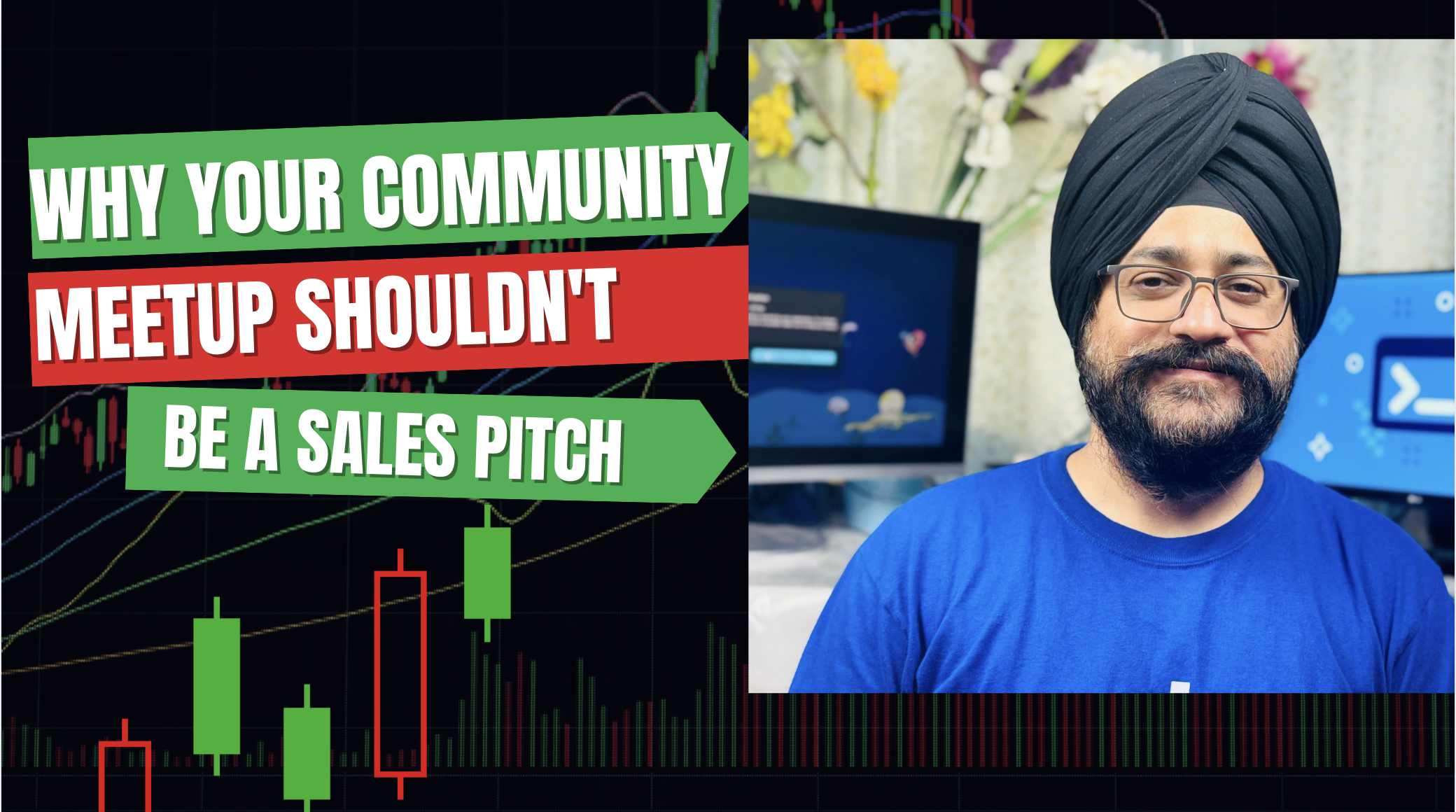
Leave a Reply